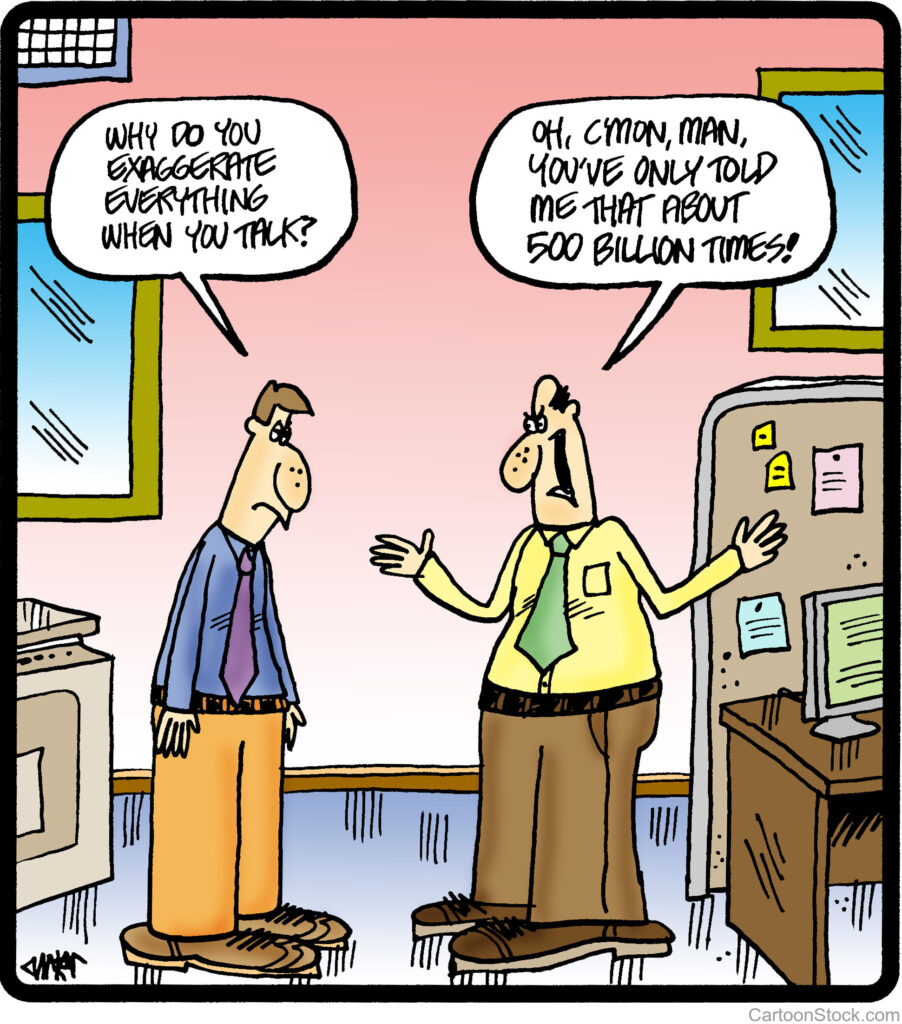
Superlatives
Superlative adjectives are seldom used correctly and they’re often overused. When we use words like best, worst, greatest, most, never, and always, we typically use them for emphasis, not accuracy. It’s sloppy usage and if used too often, the terms lose their meaning. Furthermore, overusing superlatives will ultimately undermine your credibility and weaken your voice. Used infrequently, they gain strength.
It’s easy to get into the habit of using superlatives casually or mindlessly: “It was the funniest thing I’ve ever heard” or “It’s the best show I’ve ever seen.” Be particularly careful when using superlatives to describe a person: “He’s always late.”; “She never thinks of anyone but herself.”
The overuse of superlatives in advertising has rendered it useless. When a company says it is the best roofing company in town or the finest kolache shop, or offers the freshest pasta in town, we all know better. Superlatives are like paper currency: issue too many and the value falls.
Potent words
Don’t flippantly use powerful words that should be reserved for special usage—phrases like “he’s brilliant” or “she’s a prodigy.” The frequent use of high-octane words (incredible, magnificent, one-of-a-kind) may project enthusiasm but when overused they become meaningless.
Some words may need to be retired: awesome, unique, different, great, stunning, amazing, incredible, literally. Instead of using these words—The movie was awesome. The wine is different.—be more specific and definitive: Why do you think the movie is awesome? Why do you think the wine is different? Instead of relying on worn-out, nondescript adjectives, explain your reasons “I enjoyed the movie because it addressed a social issue plaguing our society. The wine was not what I expected; a pinot grigio should have higher acidity.”
Repeating words can also undermine credibility. Saying, “We had a really, really awesome time,” is redundant.
Here’s an article about 12 words that have been so overused they really don’t mean anything anymore
Punctuation marks
My plea for moderation extends to the overuse of certain punctuation marks, particularly the exclamation point. It’s unnecessary to write, “I’m so excited about having lunch with you today!!!!!!!!” Using multiple exclamation marks consecutively dilutes the impact and is quasi-irritating. Years ago, I purposely began reducing my use of exclamation marks in my writing and correspondence. I started by limiting myself to five per year. In the past 24 months I can’t recall using even one.

This information is so relavent. Thank you so much.
Thank, Delisa, for kind and encouraging words. Don
That was a very very interesting article!!!
Thank, Jay. I hope my articles are beneficial. Don
Thank you, Don, for posting this. Those of us who love words appreciate those who use them wisely and accurately. And how about misusing pronouns, such as “me and my friend…”, and “Thank you for thinking of Ann and I”. Dick and I had a server at a restaurant tell us, “ Me and Joe will be your servers tonight”. We asked her, if Joe was mean, why did she work with him? ?. She got it.
Carol, thanks for writing. Yes, it’s good to be a “word vulture”; to care about the meaning of words and the proper way to write them. Take care, Don
I completely resonate with your sentiments. God and perhaps the Grand Canyon are awesome, but not the latest smart phone or glazed donut. The Brits sure like calling everything ‘brilliant’ – the same problem. I too have become aware of exclamation point excesses. I’m sure that millennial and younger recipients of my exclamation-free missives must be thinking “boy, is he a relic!” Incidentally, I love listening to or dialoging with educated people from the UK. As when engaging superior tennis players, such discourse raises your game.
Blessings,
Hugh
Hugh, I couldn’t agree more on what you have written. Relative to intellectual stimulation, I have some podcasts that I follow that involve very smart people talking about their area of expertise. Thanks for our friendship.
Thank you for your thoughtful and thought-provoking writings, Don. I am a writer/teacher and send out a weekly meditation to selected women. Since reading your essay here, I re-think my exclamation points and also omit needless words, such as “really” or “very.”
Thanks, Sharon, for taking the time to write. I’m happy when my posts help people in a practical way.
That is the greatest article I have ever, ever read on superlatives. Outstanding!!!!! 😉
Thanks, Steve.